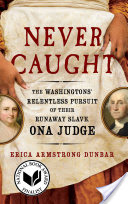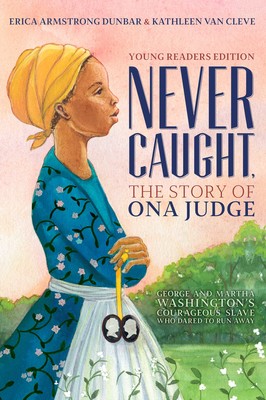Reviewed by Anndee Hochman
Review Source: Broad Street Review
Book Author: Erica Armstrong Dunbar
The summer I was 12, I spent weekday mornings on the tennis courts at Friends Central School in Wynnewood, swinging a clumsy backhand and counting the minutes until lunch. Each afternoon, I parked myself under a maple tree and devoured Gone with the Wind while sipping a Diet Coke.
We could argue about which was the greater poison.
I’d say the book. Because, while I never finished an entire can of soda, I gulped every morsel of Margaret Mitchell’s romanticized South, including the images of loyal, hardworking, genial slaves whose ministrations made Scarlett long for the antebellum days when all was ducky.
The way things were
I wish someone had pointed out that I was lolling on a campus founded by Philadelphia Quakers, many of whom who drew the line against slavery almost 200 years before the Civil War. And then, I wish someone had thrust a book like Never Caught: The Story of Ona Judge into my hands.
This book, the young readers’ version of Erica Armstrong Dunbar’s Never Caught — a 2017 National Book Award finalist in nonfiction — is a welcome, compelling corrective to the whitewashed version of Revolutionary-era history I received: a story in which the Anglo men were heroes, the black people were nameless, and slavery was simply, unquestionably, The Way Things Were.
Condemning slavery
Dunbar, a Rutgers University historian who coauthored the young readers’ version with University of Pennsylvania professor Kathleen Van Cleve, wanted to help fill an aching gap in the historical narrative.
As a student at Germantown Friends School in the 1980s, Dunbar says, “I learned very little about American slavery. It bothered me. I kept asking: Why am I not encountering people who look like me in our narratives?”
The book isn’t a diluted version of the adult Never Caught. In some ways, it delivers more than the original: a map of the Eastern Seaboard, a timeline from 1731 (Martha Washington’s birth) to 1848 (Ona Judge’s death), and the transcript of an interview Judge gave to a New Hampshire newspaper in 1845.
The young readers’ text is more emphatic about condemning slavery (described as “a grotesquerie,” an “abomination,” and a “disease”). It underscores the role of individuals, including George Washington, in furthering that system for their own wealth and comfort. It highlights the people and groups who were ahead of the abolitionist curve (like those Philly Quakers, along with Benjamin Franklin and Washington’s own secretary, Tobias Lear).
Centering Ona Judge
Most significantly, this version foregrounds Judge, who, as a 22-year-old woman owned by the most powerful couple in America, walked out of the president’s house one May evening and never came back. Continue reading.


Never Caught by Erica Armstrong Dunbar
Published by Simon and Schuster on February 7, 2017
Genres: Slavery
Pages: 272
Reading Level: Grades 3-5, Grades 6-8
ISBN: 9781501126437
Review Source: Broad Street Review
Buy at Powell's Books
Publisher's Synopsis: Finalist for the National Book Award for Nonfiction
A startling and eye-opening look into America’s First Family, Never Caught is the powerful story about a daring woman of “extraordinary grit” (The Philadelphia Inquirer).
When George Washington was elected president, he reluctantly left behind his beloved Mount Vernon to serve in Philadelphia, the temporary seat of the nation’s capital. In setting up his household he brought along nine slaves, including Ona Judge. As the President grew accustomed to Northern ways, there was one change he couldn’t abide: Pennsylvania law required enslaved people be set free after six months of residency in the state. Rather than comply, Washington decided to circumvent the law. Every six months he sent the slaves back down south just as the clock was about to expire.
Though Ona Judge lived a life of relative comfort, she was denied freedom. So, when the opportunity presented itself one clear and pleasant spring day in Philadelphia, Judge left everything she knew to escape to New England. Yet freedom would not come without its costs. At just twenty-two-years-old, Ona became the subject of an intense manhunt led by George Washington, who used his political and personal contacts to recapture his property.
“A crisp and compulsively readable feat of research and storytelling” (USA TODAY), historian Erica Armstrong Dunbar weaves a powerful tale and offers fascinating new scholarship on how one young woman risked everything to gain freedom from the famous founding father.

Leave a Reply